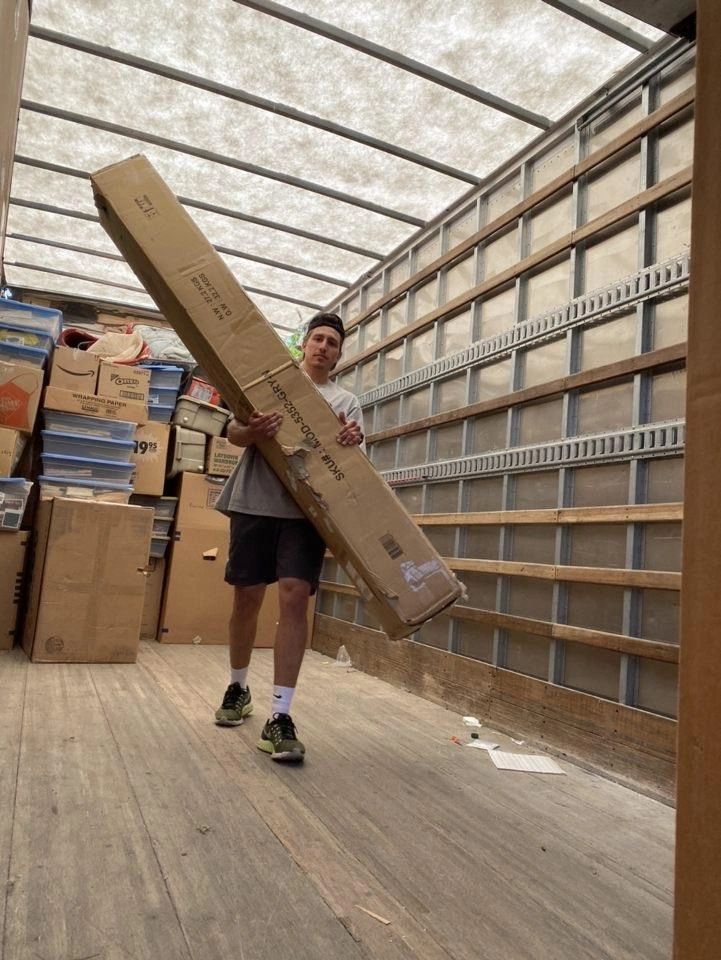Understanding the Inclusions of moving and Freight Forwarding in the World of International and residential Shipping
Guiding through the complexities of moving and Freight forwarding can be difficult. Both procedures entail distinct treatments and requirements that are crucial for successful transportation. Comprehending the distinctions in logistics, documentation, and danger administration is important for individuals and organizations alike. This knowledge can considerably influence the efficiency and safety of deliveries. Lots of are not aware of the particular components that influence the general experience and outcomes. What aspects should one consider to guarantee a smooth changeover?
The Basics of moving and Freight Forwarding
moving and Freight forwarding are basic parts of the global logistics market. They facilitate the transfer of items and individual possessions throughout domestic and worldwide boundaries. moving largely involves the moving of households or individuals, encompassing household and commercial requirements. It typically includes packing, packing, delivering, and unboxing items at the location. On the other hand, Freight forwarding is concentrated on the delivery of items, often wholesale, making use of different transportation modes, such as land.freight, air, or sea forwarders act as middlemans, collaborating logistics to guarantee timely distribution while steering via complex guidelines and customs procedures. Both processes need careful preparation, company, and communication to guarantee efficiency and lessen disruptions. Comprehending these basics is essential for anybody included in logistics, as they lay the foundation for advanced elements of shipping and transport monitoring.
Secret Elements of Freight Forwarding Services
Freight forwarding services incorporate several crucial elements that guarantee smooth transportation of items. Secret duties of Freight forwarders consist of taking care of logistics, coordinating shipments, and handling personalizeds clearance. Furthermore, recognizing vital shipping documentation is important for compliance and efficient activity of freight.
Freight Forwarder Responsibilities
A reputable Freight forwarder plays a necessary role in working with the transport of items, ensuring that shipments are managed successfully and in compliance with guidelines. Their obligations incorporate various vital tasks, including picking suitable transport routes, negotiating Freight rates, and taking care of logistics. They function as intermediaries in between providers and carriers, guaranteeing that cargo is properly packaged and labeled for secure transportation. Additionally, Freight forwarders track shipments, supplying updates to clients about the status and expected shipment times. They additionally evaluate and take care of dangers related to transport, advising insurance options as needed. By facilitating interaction and documentation, Freight forwarders simplify the delivery process, reducing possible delays and enhancing total supply chain performance.
Delivering Paperwork Fundamentals

Understanding Personalizeds Clearance and Documents
Accurate documentation is vital in the customizeds clearance procedure, as it assures conformity with numerous laws. An overview of customs regulations highlights the complexities faced by shippers and Freight forwarders. Typical clearance challenges can greatly affect delivery timelines and costs, making understanding this aspect vital for efficient logistics.
Value of Accurate Documents
Guiding with the complexities of global shipping calls for an eager understanding of customs clearance and the critical role of documentation. Precise documentation is important for making sure that deliveries adhere to guidelines and reach their locations without delays. Effectively prepared documents, consisting of expenses of lading, industrial billings, and packaging listings, promote smooth interactions with custom-mades authorities. Inaccuracies can bring about delivery delays, fines, or perhaps confiscation of items. Moreover, thorough documentation help in monitoring deliveries and fixing disagreements. Organizations involved in moving and Freight forwarding have to prioritize meticulous documentation practices to navigate the complex landscape of worldwide shipping effectively. This diligence not just simplifies procedures but also improves consumer fulfillment by making certain timely shipment.
Customs Regulations Summary
Guiding personalizeds regulations is an essential element of international trade that directly influences the success of moving and Freight forwarding operations. Reliable custom-mades clearance requires an understanding of different regulations, consisting of tolls, obligations, and import/export constraints. Exact documents is essential, as it ensures compliance with legal needs and promotes the efficient motion of goods throughout boundaries. Trick records frequently include commercial invoices, packaging listings, and expenses of lading, which supply comprehensive information about the delivery. Furthermore, customs brokers play a critical duty in guiding complex laws, acting as intermediaries between carriers and customizeds authorities. By keeping extensive understanding of customs processes, companies can considerably reduce delays and decrease prices related to global delivery.
Typical Clearance Challenges
Various obstacles can emerge throughout the customs clearance procedure, commonly making complex the movement of items throughout borders. One substantial problem wants documentation, which can result in penalties and hold-ups. Importers and exporters have to ensure all required documents, such as billings, packaging checklists, and certifications of origin, is complete and accurate. In addition, discrepancies in assessment can cause analysis from custom-mades authorities, causing added tasks or evaluations. Language barriers may also posture difficulties, as miscommunication can bring about misunderstandings relating to policies. Additionally, changes in custom-mades policies can create complication, demanding consistent watchfulness by shippers. Inevitably, getting rid of these clearance challenges needs extensive prep work and a clear understanding of customizeds requirements to facilitate smooth international transactions.
Packaging and Classifying Requirements
Although usually neglected, packaging and labeling needs play an essential role in the delivery process, making certain that products are secured and conveniently recognizable throughout their journey. Appropriate packaging safeguards things from damages throughout transit, while additionally helping with effective handling and storage space. Making use of appropriate materials, such as bubble cover, foam, or tough boxes, can stop damage and loss.Labeling is similarly important. Exact and clear labels convey crucial information, consisting of the location, managing guidelines, and materials. Tags have to conform with regulations certain to international and domestic delivery, which might consist of hazardous products recognition or customs declarations.Moreover, standardized labeling methods simplify the monitoring process and enhance overall logistics efficiency. By sticking to product packaging and labeling demands, companies lessen the danger of hold-ups, damages, or shipping overseas misdelivery. Ultimately, these practices add greatly to the success of moving and Freight forwarding procedures, ensuring a smooth delivery experience for all events involved
Tracking Shipments: Value and Approaches
Efficient packaging and labeling established the foundation for effective delivery administration, yet tracking shipments is just as essential in the shipping procedure. Shipment monitoring provides real-time presence, which assists consumers and businesses keep an eye on the progress of their goods. This transparency enhances consumer complete satisfaction, because customers can remain notified about shipment timelines and any possible delays.Several methods facilitate efficient tracking. Barcode scanning is a typical method, using unique identifiers to check plans throughout their trip. Furthermore, general practitioner technology makes it possible for accurate location monitoring, enabling for prompt updates and improved logistics monitoring. Several shipping business now supply digital systems and mobile applications that provide individuals with easy accessibility to tracking information.The significance of shipment monitoring can not be overstated; it decreases the risk of shed or damaged goods, boosts operational effectiveness, and fosters trust fund between recipients and carriers. As a result, incorporating efficient tracking methods is important for effective domestic and global delivery operations.
Insurance Options for Your Product
Protecting insurance coverage for items in transportation is a crucial factor to consider for people and services alike. Insurance coverage choices vary based on the kind of delivery, value of goods, and particular risks involved. Common kinds include provider responsibility, which covers loss or damage while in transit, and full-value insurance coverage, giving substantial coverage for the total value of the goods.Shippers may likewise take into consideration marine insurance for worldwide deliveries, shielding versus dangers related to sea transportation. It is important to assess the particular demands of the delivery and evaluate the conditions of any kind of policy.Furthermore, comprehending exemptions and restrictions is important to prevent possible voids in insurance coverage. Shippers ought to involve with insurance professionals to check out tailored options that fit their distinct situations. Inevitably, buying the best insurance can alleviate monetary dangers and offer peace of mind throughout the delivery procedure.
Selecting the Right moving and Freight Forwarding Solution
When selecting a moving and Freight forwarding solution, it is important for organizations and individuals to thoroughly examine their certain requirements and top priorities. Factors such as the quantity of products, destination, and timeline play a substantial role in this decision-making procedure. Researching various providers is suggested; contrasting their solutions, rates, and customer reviews can expose important insights.Additionally, it is essential to take right into account the experience and experience of the provider in managing certain kinds of freight, particularly for global deliveries that may involve customizeds clearance. Openness in pricing, including any kind of surprise charges, should also be scrutinized.Furthermore, examining the level of consumer assistance supplied is vital, as timely communication can mitigate problems throughout transportation (overseas movers). Validating the accessibility of insurance coverage alternatives assures that products are protected throughout the delivery process. By taking these actions, services and people can make enlightened selections that align with their logistics demands
Regularly Asked Concerns
What Sorts Of Product Can Be Shipped Worldwide?

Just How Do Delivery Costs Differ In Between Various Service Providers?
Shipping costs vary significantly between providers due to factors such as solution speed, cargo type, distance, and extra services supplied. Each service provider's rates model reflects these variables, influencing overall delivery costs for customers.
Can I Ship Hazardous Products or Perishables?
Shipping dangerous materials and perishables goes through rigorous regulations. Providers often require specific packaging, labeling, and paperwork. Carriers need to assure conformity with global and neighborhood regulations to prevent charges and guarantee secure transportation.
What Should I Do if My Delivery Is Delayed?
When confronted with a shipment hold-up, one should first speak to the copyright for updates. Then, review any type of notices received, evaluate different options, and maintain all events educated about the scenario to reduce disturbances.
Are There Weight Limits for Shipping Containers?
Weight limitations for shipping containers differ relying on factors like container size and shipping guidelines. Usually, typical containers have an optimum gross weight of around 30,000 to 32,000 kgs to guarantee risk-free transport and handling. In contrast, Freight forwarding is concentrated on the shipment of goods, usually in bulk, using different transport settings, such as air, sea, or land.Freight forwarders act as intermediaries, collaborating logistics to ensure prompt delivery while maneuvering with complicated laws and customs treatments. Key obligations of Freight forwarders consist of handling logistics, working with deliveries, and handling personalizeds clearance. A trustworthy Freight forwarder plays an essential duty in coordinating the transport of products, ensuring that deliveries are dealt with efficiently and in conformity with policies. Reliable packaging and labeling established the structure for successful delivery administration, yet tracking shipments is similarly crucial in the delivery process. Several shipping companies now use electronic systems and mobile applications that provide users with easy access to tracking information.The importance of delivery monitoring can not be overemphasized; it decreases the threat of lost or damaged items, boosts functional efficiency, and fosters depend on between carriers and recipients.